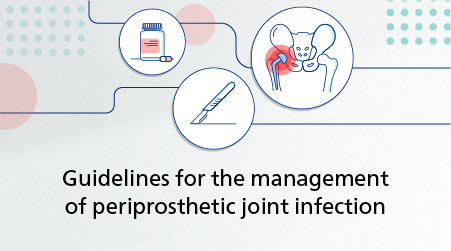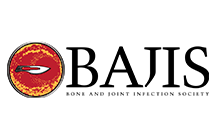

About the Guidelines for the management and treatment of periprosthetic joint infection programme
This programme of eLearning has been developed to provide you with information and guidance on how to manage patients with Prosthetic Joint Infection (PJI). It has been designed to support people in any healthcare role where they might be caring for someone with a suspected or actual prosthetic infection. Prosthetic Joint Infection can have a devastating impact on patients and their families. This eLearning module aims to ensure that you can recognise and refer patients for the correct treatment in a timely manner so that they have the best chances of a good recovery.
The module provides essential information about Prosthetic Joint Infection, the Patient Experience of PJI, Guidelines for management of PJI, and key resources. A CPD certificate will be provided following the successful completion of the assessment.
More information
Prosthetic Joint Infection is one of the most devastating events that can occur after joint replacement and significantly impacts both patients and the surgeons who treat them. The outcomes of PJI can be vastly improved if best practice guidelines are adhered to. This module uses evidence-based guidelines as a basis for understanding how PJI guidelines are relevant to all healthcare professionals who look after patients who have had a joint replacement, and how best to manage those patients.
Primary and secondary audiences
Healthcare Professionals involved in the management of PJI including orthopaedic surgeons, physiotherapy and rehabilitation professionals, orthopaedic and community nurses, Accident and Emergency, and General Practice.
Acknowledgements
We would like to thank the patients who took part in the INFORM Programme, and the INFORM Patient Advisory Group (Patient involvement | Inform (bristol.ac.uk). We would also like to thank the healthcare professionals who took part in the development and implementation of the INFORM guidelines from the following Trusts:
- North Bristol NHS Trust
- Royal Devon University Healthcare NHS Foundation Trust
- University Hospitals Coventry and Warwickshire NHS Trust
- Wrightington Wigan and Leigh Teaching Hospitals NHS Foundation Trust
- Norfolk and Norwich University Hospitals NHS Foundation Trust
- South Tees Hospitals NHS Foundation Trust
- Robert Jones and Agnes Hunt Orthopaedic Hospital (RJAH) NHS Foundation Trust, Oswestry
- University Hospital Southampton NHS Foundation Trust
- Royal Cornwall Hospitals NHS Trust (Truro)
- St George’s University Hospitals NHS Foundation Trust
- Imperial College Healthcare NHS Trust – Charing Cross Hospital
- Northumbria Healthcare NHS Foundation Trust
The research on which this NHSE Learning Module is based was funded by a National Institute for Health & Care Research (NIHR) Programme Grant (RP-PG-1210-12005) and a follow-on Programme Development Grant (NIHR202943). The views expressed are those of the authors and not necessarily those of the NIHR or the Department of Health and Social Care. NIHR is funded by the Department of Health and Social Care. Its work in low and middle income countries is principally funded through UK international development funding from the UK government.
Academic team

Andrew Moore
Associate Professor in Musculoskeletal Health Services Research
Wendy Bertram
Senior Research Associate in Musculoskeletal Health Services
Josh Lamb
Consultant Senior lecturer, Consultant Orthopaedic Surgeon
Gemma Munkenbeck
Study Coordinator
TEL team

Sarah Gray
Programme Manager - Technology Enhanced Learning, NHS England
Nicole Beckford
Senior Project Manager - Technology Enhanced Learning, NHS England
Tracy Watkins
Lead Learning Designer - Technology Enhanced Learning, NHS England
Evelyn Lindsay
Graphic Designer - Technology Enhanced Learning, NHS England
How to access
To access this elfh programme, you will require a Learning Hub account. If you do not have one, then you can register by selecting the Register button below. Note that if you hold a full elfh account, you can sign into the Learning Hub using your existing login credentials.
To view the Guidelines for the management and treatment of periprosthetic joint infection programme, select the View button below. If you already have a Learning Hub account, you will also be able to login and access the resources within the programme.
Not an NHS organisation?
If you are not an NHS health or care organisation and therefore do not qualify for free access to the Learning Hub, you may be able to access the service if you have an existing OpenAthens account. Please go to Learning Hub and sign in with your existing credentials.
If you do not have an existing OpenAthens account, please contact elfh directly to check whether you may be eligible for access.
Registering large numbers of users
If you are an HR, IT or Practice Manager and would like to register and enrol large numbers of staff within your organisation for access onto the Guidelines for the management and treatment of periprosthetic joint infection programme , please contact elfh directly.
Organisations wishing to use their own LMS
For HR departments wanting to know more about gaining access to courses using an existing Learning Management System please contact elfh directly to express interest.
More information
Please select the following link for more information on how to use the Learning Hub.





